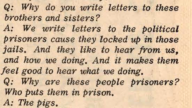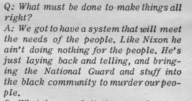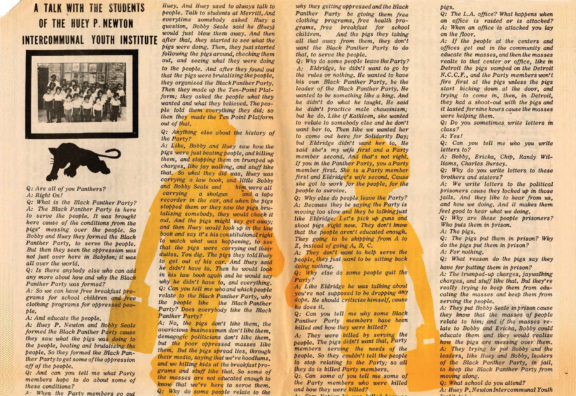Taking up several pages, this extensive interview provides a look into the early months of the Youth Institute from the students’ perspective.
As with most other articles in The Black Panther, no author is named. The students’ responses are similarly anonymous and are collective, with one or two answers for each question rather than a response from each individual. A large portion of the interview is dedicated to party ideology and history. The students possess extensive knowledge of the party’s goals and strategies to meet them, from the breakfast program to racist police brutality.
In the IYI early days, students were exclusively children of party members, and according to the interview, identified strongly as such themselves. The students describe not only the founding of the party, but also its ideology, espousing the need for education for a successful revolution, the importance of controlling the means of production, and the systems of capitalism the party sought to overthrow. They often refer to the “pigs,” not only when talking about police, but also other others who profit from racial economic inequality.
The interviewer asks about members of the party who have left or been killed by the pigs, and the students again reveal their substantial understanding of these events, perhaps from school or their families. They speak about drug use and police violence, topics that young students in a mainstream American family may be shielded from, exemplifying how the young panthers were treated and spoken to as equals, learning difficult truths for their own safety.
The IYI principle of learning through experience is seen in the letters that students write to political prisoners. 
The students then discuss their previous school experiences. Many describe their disinterest in the material and experience with physical punishment, suspension, and expulsion. Students described how their teachers had praised slave-holding historical figures, or made little effort to actually teach, and how school lunch cost money. At the IYI, on the other hand, students say they learn relevant and truthful history, and no one is written off as innately unintelligent. Rather, students are met at their level, placed according to ability in order to best meet their needs. The IYI aimed to equip students with the knowledge necessary to survive in society, from math and reading to philosophy. They also learned elements of Panther ideology. 
The students describe how their previous schools attempted to brainwash them into accepting the system through the pledge of allegiance and class visits from police officers, while the IYI teaches them to challenge it. The students learn both the importance of discipline for survival, as well as the societal changes advocated for by the Panthers. They describe the future they hope to build, equipped with the knowledge and tools from their comrades/teachers at the IYI. 
